In the midst of adversity and displacement, humanity often finds a way to prevail, manifesting resilience and hope even in the darkest of times. Such is the story unfolding in Manipur, where amidst the challenges of displacement, the arrival of new life has brought rays of hope and renewed strength to those enduring hardship.
In recent years, Manipur, a northeastern state of India, has faced significant internal displacement due to various factors, including ethnic conflicts, natural disasters, and socioeconomic challenges. Thousands of families have been uprooted from their homes, forced to seek shelter in overcrowded relief camps or makeshift settlements, where access to basic necessities, including healthcare, remains a constant struggle.
Amidst this backdrop of adversity, a remarkable phenomenon has emerged – the birth of over 200 babies in shelters designated for the displaced population. These births represent not only the continuation of life but also a testament to the resilience of communities grappling with displacement and uncertainty.
The arrival of a newborn is always a cause for celebration, but within the confines of a shelter for the displaced, it carries a deeper significance. It symbolizes the triumph of hope over despair, reaffirming the innate human spirit’s capacity to endure and persevere in the face of adversity.
For the mothers giving birth in these shelters, the experience is fraught with challenges and uncertainties. Access to adequate prenatal care and medical facilities is often limited, exacerbating the risks associated with childbirth. Yet, despite the obstacles, these mothers display remarkable courage and resilience, drawing strength from the promise of new life and the support of their communities.
In many cases, the birth of a child in a shelter brings together the displaced community, fostering a sense of solidarity and unity amidst shared hardship. Neighbors become extended families, offering support and assistance to new mothers and their infants. From sharing resources to providing emotional comfort, these acts of kindness exemplify the collective resilience of communities facing displacement.
Moreover, the birth of babies in shelters underscores the urgent need for enhanced support and resources for displaced populations, particularly in terms of healthcare and maternal services. Governments, humanitarian organizations, and civil society must work together to ensure that pregnant women and new mothers in displaced settings receive the care and assistance they need to safeguard their health and the well-being of their children.
Furthermore, efforts to address the root causes of displacement, including conflict resolution, disaster preparedness, and sustainable development initiatives, are essential for preventing future crises and creating conditions conducive to stable and thriving communities.
While the challenges of displacement are complex and multifaceted, the birth of over 200 babies in shelters for the displaced in Manipur serves as a poignant reminder of the enduring power of hope and the resilience of the human spirit. In the face of adversity, communities come together, drawing strength from the promise of new life and the bonds of solidarity.
As we celebrate the arrival of these newborns, let us also reaffirm our commitment to supporting displaced populations, ensuring that every mother and child has access to the care, resources, and opportunities they need to thrive. By standing together and offering hope in times of despair, we can build a brighter and more resilient future for all.

